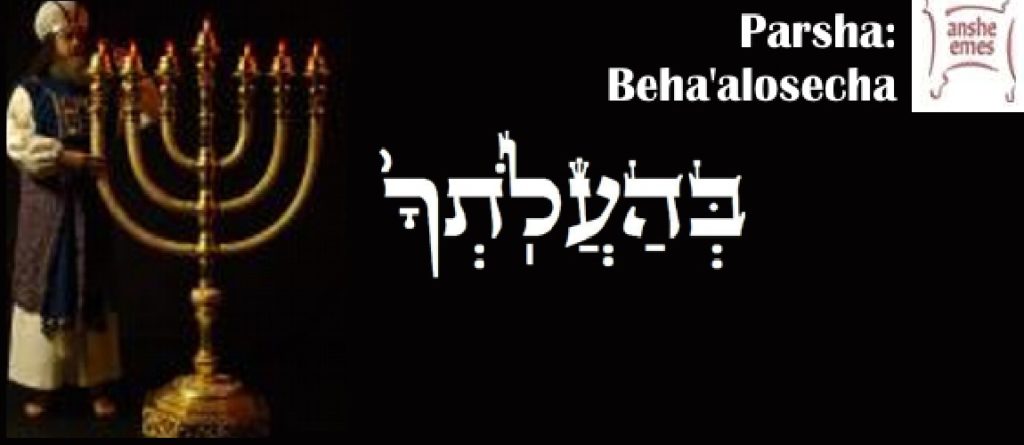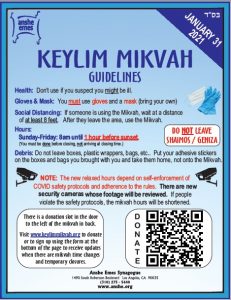
I. Summary
A. The Menorah/Consecration of the Levi’im. Aharon was entrusted with arranging the outer six lamps of the Menorah so that their lights projected towards the seventh (and central) shaft. The Levites were readied for Mishkon service by purifying themselves through washings and sacrifices. Levi’im between the ages of 30-50 were to take part in such service; those between the ages of 25-30 were to be trained for future service.
B. The First Pesach. The first Pesach after the Exodus was observed on the 14th of Nissan. Those who were impure appealed to Moshe and Aharon to be allowed to participate in the Pesach offerings; a special date (the 14th of Iyar) was set aside for them (and for those who were too far away on the regular day for the Pesach offering) to bring the Korban Pesach offering (the “Pesach Sheni”).
C. The Israelite’s March. Hashem lifting His cloud from the Mishkon was a signal for the Israelites to continue their journey. Moshe was commanded to make two silver trumpets to be used to announce the march, summon the assembly to the Mishkon, sound an alarm before battle, and proclaim joyous occasions such as Festivals and the New Moon. After almost a year in the Sinai, the Israelites journeyed to the wilderness of Paran; Yisro, Moshe’s father-in-law, refused Moshe’s invitation to join them, choosing instead to return to his native land of Midian.
D. The Israelites Complain/The 70 Elders. During the journey, the people began murmuring against Hashem’s leadership. Hashem became angry, and caused a fire to burn in their midst, prompting terror and destruction. Moshe’s prayers to Hashem on their behalf caused the fire to abate. The Israelites, however, didn’t learn their lesson and proceeded to complain about the lack of meat in the desert, bemoaning the fact that they left Egypt. (Moshe began to feel that the burden of leading them was too much for him to bear alone; Hashem told him to assemble 70 Elders, who would constitute a Sanhedrin, to assist him. The Elders [who were chosen from the foremen who had been the Jewish taskmasters in Egypt and who, when Pharaoh ordered them to punish the Israelites, allowed themselves to be beaten in lieu of inflicting punishment on their brethren] were assembled and the spirit of prophecy rested upon them.) In response to the people’s complaints about the lack of meat and the boring taste of “manna”, Hashem caused the wind to bring many quails — enough for the people to eat meat for a full month — from across the sea; the people gathered them greedily, but when they began to eat, many of them died as punishment for their lack of faith in Hashem.
E. Miriam Is Punished With Leprosy. Miriam, Moshe’s sister, was punished with leprosy for making defamatory statements to Aharon about Moshe. After a week outside the camp, she was completely healed.
II. Divrei Torah
A. Growth Through Torah (Rabbi Zelig Pliskin)
Focus On The Good Instead Of Complaining About What Is Wrong. Rashi comments that the people had no real cause to complain, but were simply looking for an excuse to separate themselves from Hashem. We also use complaints to distance ourselves from:
1. Hashem — by finding what sounds like a complaint, we rationalize remaining distant from Him. By focusing only on what is missing, we remain blinded to what we have; no matter how much we have, there is always something to complain about if we look hard enough. This is a prescription for misery, and a direct contradiction to our obligation to be grateful to Hashem. Appreciating what we have is crucial to our spirituality and happiness; and
2. Others — by focusing on what others do wrong, or what they do that isn’t enough, we try to free ourselves from gratitude for all they have done for us. This fault causes misery for both us and others. In addition, our Sages teach that one who doesn’t appreciate what others do for him will eventually deny the good Hashem has done for him.
B. Lil’Mode U’lilamed (Rabbi Mordechai Katz)
1. Consistent Devotion. The Torah tells us that Hashem commanded Moshe to instruct Aharon how to light the Menorah, and that “Aharon did so . . . as Hashem had commanded Moshe”. Rashi notes that this language is to commend Aharon for acting in accord with Hashem’s instructions. But, are we to expect anything less from someone as great as Aharon? The Sfas Emes, z’tl teaches that it is human nature to begin a task with great enthusiasm, but to eventually begin to perform it more out of habit than devotion. Aharon is being praised for beginning his duties with the most fervent of devotion and maintaining that devotion throughout his many years of services. We must avoid taking the performance of mitzvos (e.g., prayer, Shabbos, acts of kindness) for granted, but remain aware that we are fulfilling Hashem’s will and, accordingly, strive to maintain the appropriate level of devotion and enthusiasm.
2. We must always strive to reach our goals. The word “Beha’aloscha” comes from the word “to raise”; the Menorah’s fire was to be directed into an upward direction, inspiring us towards even higher goals in our lives and connection to Hashem.
C. Kol Dodi on the Torah (Rabbi David Feinstein)
Arousing the spirit in others. And Hashem said to Moshe “I will take from the spirit which is on you and place it on them [the 70 Elders], and they shall bear with you the burden of the people”. Rashi explains that this means that Moshe’s spirit will make the others great. But, if Moshe felt that he wasn’t strong enough to bear the burden of leading the Jewish people alone, wouldn’t the sharing of his spirit weaken, not strengthen, him? Rashi explains that Moshe was like a candle — no matter how many candles are lit from it, its own light isn’t diminished. Thus, Moshe would remain unchanged while the others would glow from their exposure to him, and together they would bear the burdens of leadership. When we give of our spirit to others — our children, friends, colleagues, students, etc. — we can arouse their spirit and, in turn, be strengthened ourselves.
D. In the Garden Of The Torah (the Lubavitcher Rebbe, Menachem M. Schneerson, z’tl)
1. A Path Of Light. In Proverbs, King Solomon writes “educate a child according to his way; even when he grows older, he will not depart from it”. The teaches us several concepts about the Torah approach to education, and this Parsha:
a. The Goal of Education. The goal of education is not merely a means to transmit information, but to mold a student’s character — to set his/her feet on a path on which he/she can follow his/her entire life; to instill a standard of values and principles that teach him/her how to look ahead and face and overcome life’s challenges. When a child has learned principles and values which ring true, he/she will feel energy which will seek expression in positive life experiences.
b. Encourage Individuality. Important in education is the realization that every child has “his/her way”. As the Rebbe Rayatz, zt’l taught, “each individual Jew has a spiritual mission in his life”. Although we all share the common goal of transforming our world into a dwelling place for Hashem, we each have individual gifts and tendencies. Expression of these different tendencies allows the Divine purpose to be manifest in various paths, giving it a more comprehensive scope.
2. The Connection to this week’s Parsha.
a. The bulk of the Torah reading describes the preparations for, and the initial stages of, the journey of the Jews through the desert. The Baal Shem Tov explains that these journeys are reflected in the journeys of every individual through life. The Jews didn’t remain at Mt. Sinai; rather, they took the Torah and the Sanctuary with them as they set out on their journey through the desert of the world. Similarly, the kindling of the light in a person’s soul — the goal of education — enables him/her to take the “light of Torah” with him/her into his/her journeys through the world.
b. The Menorah symbolizes the Jewish people, whose purpose it is to spread Divine light throughout the world. The Menorah extends upward in seven branches, which symbolize the seven different paths of Divine service; yet, it was made of a single piece of gold to indicate that the various qualities of the Jewish people do not detract from their fundamental unity. Diversity need not lead to division, and the development of true unity comes from a synthesis of different thrusts, every person expressing his own unique talents and personality.
E. Living Each Day (Rabbi Abraham Twerski)
The Centrality of Humility. “Moshe was humble, more than any other human being on earth.” Moshe obviously had many fine character traits; why, then, does the Torah mention only his humility? Since humility is the source of all other commendable traits. While Moshe was aware of his tremendous gift of prophecy, he nonetheless remained humble. One of the Chassidic masters related a parable of a king who, wanting to get a first-hand look at life in his kingdom, disguised himself as a foot soldier and asked one of his officers to escort him. Wherever they went, the townspeople gave honor to the officer and ignored the king. The officer, however, wasn’t pleased with the recognition — “if only they knew who it is that is with me”, he thought “in their ignorance of his presence, they accord honor to me”. One who is aware of Hashem’s constant presence and awesome majesty isn’t affected by honor; rather, like the officer, he becomes more humble. We shouldn’t deny our potential but, by recognizing that whatever we have is a G-d-given gift, should remain aware to whom the honor for our achievements really belongs.
F. Love Thy Neighbor (Rabbi Zelig Pliskin)
1. The Prohibition Against “Loshon Hora” (“gossip”). Miriam heard from Moshe’s wife Zipporah that he had separated himself from her; Miriam felt his behavior was improper and related this to her brother Aharon. The Chofetz Chayim learns out from this several principles about loshon hora: (a) it is prohibited even if you are speaking about someone who is humble and doesn’t mind others speaking against him (for this reason, immediately after Moshe was spoken against, the Torah states that Moshe was humble); (b) even if one has done favors for another (e.g., Miriam saved Moshe’s life when he was an infant), one doesn’t have a right to speak against him; and (c) the prohibition even applies to telling just one other person, and even if the recipient is a relative who won’t relay it to anyone else.
2. We should aid in their time of need even those who act against us. Not only did Moshe not get angry at Miriam for speaking against him, but he even prayed for her recovery.
G. Majesty of Man
Hashem’s guidelines for giving rebuke. In rebuking Miriam and Aharon for speaking loshon hora, Hashem said “please listen to My words . . . ” Why was it necessary for Hashem to soften his rebuke, especially when dealing with people on as high a level as Miriam and Aharon? Hashem, in His infinite wisdom of human nature, knew that His rebuke would lose some of its effectiveness if it wasn’t given in this imploring manner. The Sifsei Chachamim concludes that if Hashem addressed His servants in such a manner, how much more so should we speak gently to others, correcting them with love and gentleness. If our words come from the heart, they are more likely to penetrate and be accepted in our friends’ hearts as well.
H. Genesis Project
Our obligation to “light” the Menorah. “The week’s reading begins with the Commandment to light the Menorah in the Tabernacle. And as my teacher Rabbi Asher Z. Rubenstein pointed out, G-d doesn’t need our candles. He doesn’t need our light. There is no darkness before G-d. In a house, the narrowest part of a window is on the outside – this is even true today. This method of construction allows maximal light to enter the house through the window. Yet the Holy Temple was constructed with just the opposite design – to allow the internal light of the Temple to radiate outwards. So G-d doesn’t need our light – what He wants is for Israel to be engaged in the act of lighting. Yet, what does this symbolize? The answer may be found in Proverbs (20:27): “The light of HaShem is the soul of man.” [“Ner HaShem Nishmas Adam.”] Again, G-d does not need our light, but He offers us the opportunity to radiate light. And we are to be involved with the lighting. This applies, said Rav Rubenstein, not only to ourselves. If we find a “candle” which isn’t burning, it is our obligation to light it. If we find a Jewish soul which is not shining, we cannot leave it dim. Torah enlightens the mind and gives joy to the heart. A person may be “dim” because he or she is unhappy, or simply lacking the shine of Jewish spiritual life. One way or the other, we must participate in sharing light. One candle can light thousands of others – if it is, itself, burning brightly. There is no question – here too, G-d does not “need” our help. He alone can light the lights. But He wants us to be involved in the lighting. We — every one of us — has the opportunity to share, and to grow brighter along with others. G-d gives us not merely a place under the lights – He gives us the opportunity to radiate on our own, and to help others to shine as well.




 Visit the group and request to join.
Visit the group and request to join.
